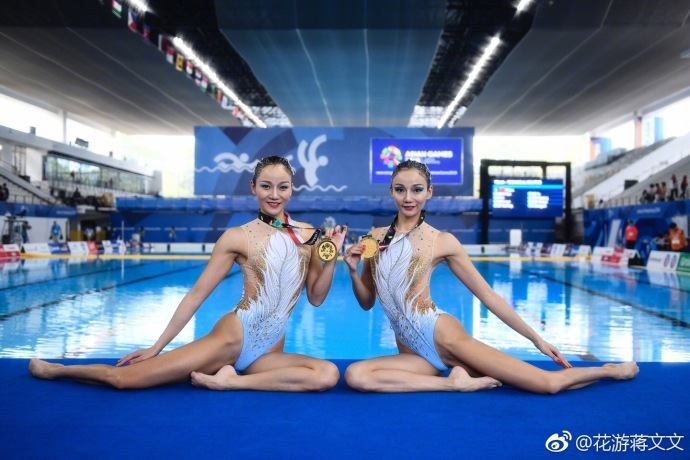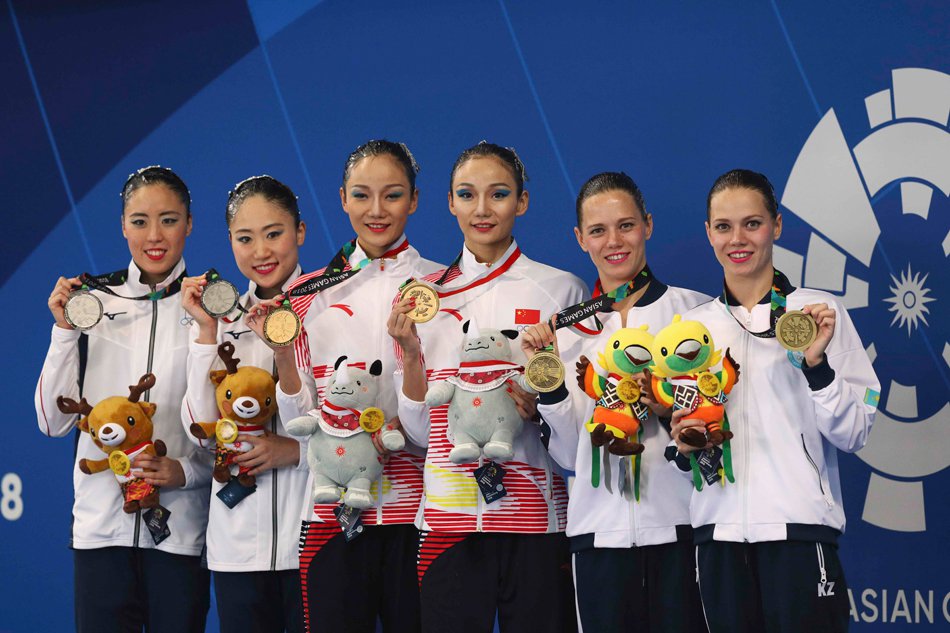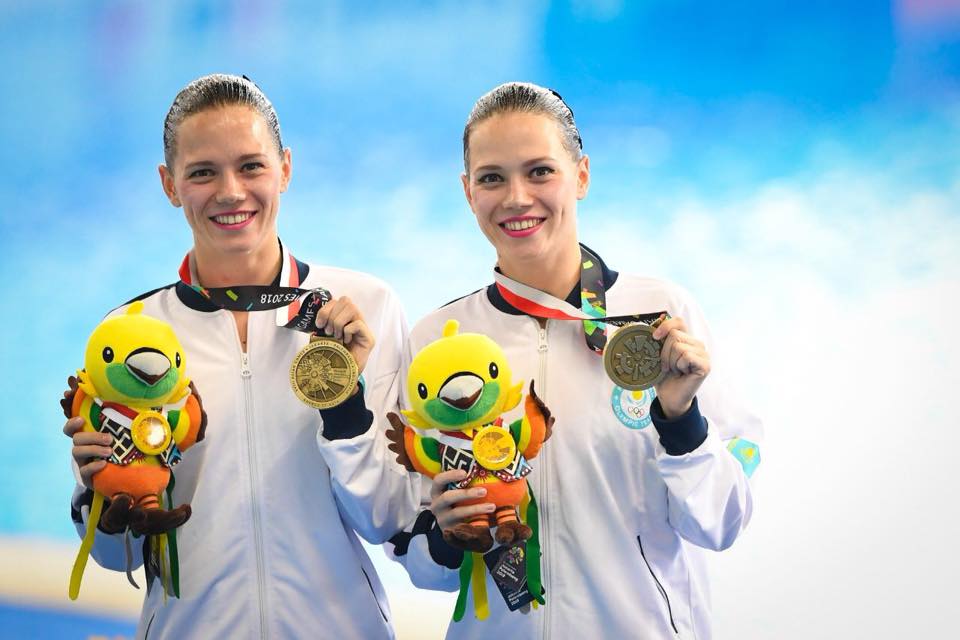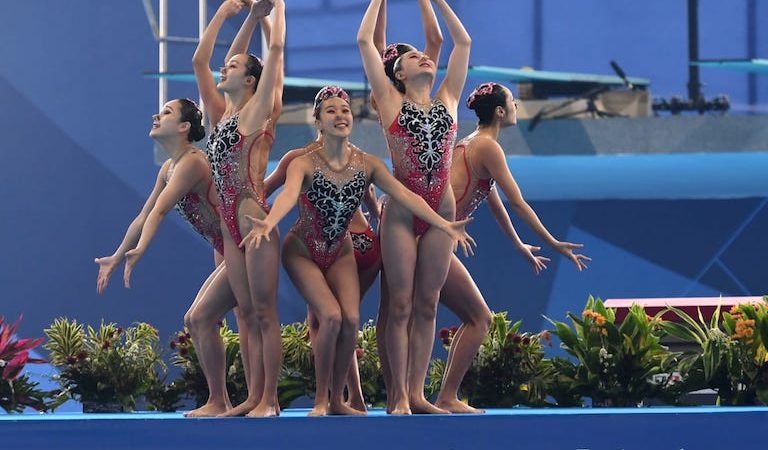The synchro events at the 2018 Asian Games concluded a few days ago in Jakarta, Indonesia, and the podiums were exactly the same as at the last edition in 2014 in South Korea. The Chinese swept both gold in duet and team, while Japan was second in both events. Kazakhstan earned the duet bronze, while North Korea grabbed the team bronze.
This competition followed the same format as the Olympic Games, where the scores of the technical routine and the free routine are added up to determine the overall and final rankings.
China was stellar once again at these Asian Games and could not be denied the two gold medals that were up for grabs. Jiang Tingting and Jiang Wenwen swam the same routines we’ve seen from them these past few years with their Flamenco tech and the Swan Lake free, where they earned 92.4101 and 94.1000 respectively, for a total score of 186.5101.
This is the twins’ third Asian Games gold medal after also winning in Doha in 2006 and in 2010 in Guangzhou, China. This is a pretty astounding feat from the Jiang sisters to win another gold 12 years after claiming their first.

The Chinese team roster was extremely experienced, and its superiority in the event came as no surprise. All were part of the historical win in combo at the world championships last year, and half the swimmers are also 2016 Olympic silver medalists. The routines were the same as worlds, and the speed and execution were once more superb. Both routines were very homogeneous, fast-moving, sharp, clean and tight. If anybody can come close to Russia, it’s this team.
On the contrary, Japan‘s team was filled with younger and less experienced swimmers, but they did manage to earn the country two silver medals. The new duet of Yukiko Inui and Megumu Yoshida fared well for having only officially been paired together for two months. The two performed the same routines we had seen earlier this year from Inui and her partner at the time Kanami Nakamaki. They earned 90.2363 in tech and 92.1000 in free.

Head coach Masayo Imura is betting a lot of Yoshida to be Inui’s partner for the next two years and for the next Olympics. Hopefully, these two will remain together as it is time Japan finds a permanent duet now, only two years out from Tokyo 2020. Both scores received here are certainly within reach of the Ukrainians, who have placed behind the Japanese duet in the few competitions where the two nations faced each other this season.
The Japanese team faced a high turnover rate after the 2017 world championships, with only three members from that team present at the Asian Games. The routines are a bit more heterogeneous compared to the Chinese, and the difference in skills and experience sometimes comes through at times. The team obtained a season-high of 90.9357 in tech, but unfortunately recorded a season-low of 91.9333 in free, which was also its worst free score in over four years. Just like with the duet, Japan will need to find some stability moving forward, and sooner rather than later, if it hopes to keep the Ukrainians at bay at the next Olympics.
North Korea rounded out the medalists for the team event. Much like China, this was an experienced team as the roster was identical to the one from worlds. The routines remain very much in the style that we can expect from the nation, with traditional music and sharp and tight movements. However, the free team did have some “space-battle” feels at times with a bit too much sound effects at times, but it was an interesting stylistic change. That said, it’s a nation on the rise that could very well vie for an Olympic team spot in 2020 if it keeps improving at this rate. The tech team scored 1.6596 points more than in Budapest, while the free team earned 86.3333, a 2.5666 improvement.
Its experienced duet of Hae Yon Min and Hyon Ok Jang finished fourth but did not see the same sharp increase in scores as the team. However, we saw at this year’s junior world championships that it has a very promising duet that is maybe just as good, if not better, than this senior pair. With this team and the up-and-coming junior talent (at least that we saw of), the North Koreans could very well become an underdog threat in the next two years.

Alexandra and Yekaterina Nemich from Kazakhstan defended their bronze medal from 2014 in the duet event. The twins continued their steady progress and scoring improvements, with routines choreographed by Anastasia Ermakova. They obtained 84.7178 in tech and 86.1667 in free. They had already surprised last season by qualifying to the free duet final at the world championships, and it is looking like another likely possibility for next year. The team had some difficulties in the technical event, and suffered a penalty for an out-of-sync lift. It did earn however a season-high of 80.5444 there, and a 82.5000 in free to finish fourth overall.
South Korea entered a team at the Asian Games for the first time ever, and in a major international competition for the first time since 2003. We had already seen the South Koreans this year at the Japan Open, and it is undoubtedly preparing to have a full team for next year’s world championships to be held at home in Gwangju. It managed to land in sixth behind Uzbekistan with a score of 153.2623.
Of random note, Russia’s 2016 free team music appears to be very popular among the Asian nations in attendance, as both Indonesia and Hong Kong used it as their own free team music.

